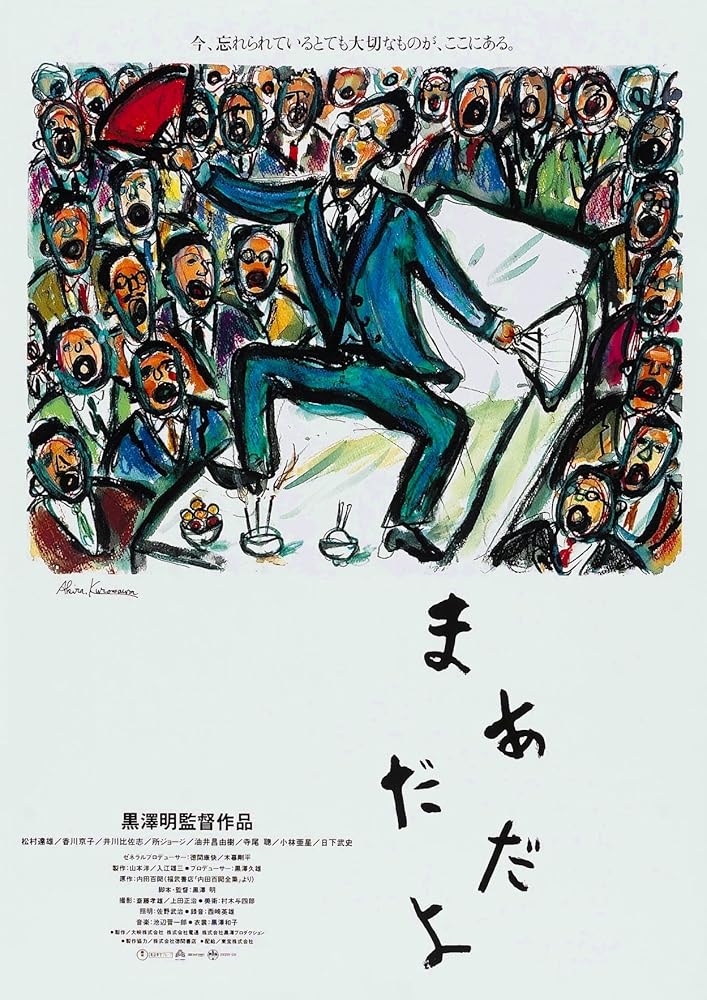
MADADAYO (NOT YET)
(director/writer/editor: Akira Kurosawa; screenwriter: based on the book by Hyakken Uchida; cinematographers: Takao Saito/Masaharu Ueda; music: Shinichiro Ikebe; cast: (Tatsuo Matsumara (Professor Hyakken Uchida), Kyoko Kagawa (Professor’s Wife), Hisashi Igawa (Takayama), George Tokoro (Amaki); Runtime: 134; MPAA Rating: NR; producer: Hisao Kurosawa; Winstar Cinema; 1993-Japan-in Japanese with English subtitles)
“Kurosawa’s swan song is a personal and overly sentimental story of a real-life retired university professor and literary figure.”
Reviewed by Dennis Schwartz
Madadayo was made when Akira Kurosawa (1910-1998) was 83 and this was his 30th and last film in a career that spans 50 years in which he has received all kinds of accolades as well as some criticism, as he regrettably ends his distinguished career on such a trite and minor film. Kurosawa’s swan song is a personal and overly sentimental story of a real-life retired university professor and literary figure, the one whose book the film is based on — Hyakken Uchida — a hero of Kurosawa’s. Hyakken Uchida retired from teaching German literature at middle-age to write full-time. Among his finest works is a collection of essays entitled Nora, My Lost Cat. The academic is played by Tatsuo Matsumura.
When the prof announces his retirement in 1943 to continue a writing career, he receives accolades from his devoted former male students that he greatly influenced and they get the reclusive man to meet with them once a year to celebrate his birthday with drink and stories. In a film that is largely set in the war years and has many characters, surprisingly the most dramatic moment in the movie concerns the disappearance of a pet cat. The stale narrative consists of overdrawn and embarrassing episodes where the fawning students drink too much, fall into a hopeless spell of nostalgia, tell bland tales, sing weary songs and reminisce about the good old days, and then become so overcome with emotion they become teary-eyed. It’s an example of Kurosawa’s humanistic approach toward films and how if not handled properly turns to mush.
The big joke is that the prof was a man of 60 when he retired, but for the last 17 years he is teasing his death by drinking a big glass of beer and saying “not yet.” That scene which gives the film its title, is played out for all it’s worth as the former students chant ”Mahda-Kai?” (”Are you ready yet?”) and he responds by saying, ”Madadayo” (”Not yet”). The other highlights of his life that are recounted range from his first birthday celebration after retirement, his reclusive period when he earns money writing, and the war years when his excellent house is bombed in an air raid and he and his wife (Kyoko Kagawa) are forced to live in a shack on a burned-out estate–but he still retains his sharp (or if you will, his corny) sense of humor. On his 77th birthday he gives his students’ grandchildren advice: “Find something you treasure, work hard at it and make a career of it.” I would like, if I may, to offer some advice of my own: avoid being so sentimental, try to keep your films from becoming dull and so slight, and don’t try to be so loved that it becomes so transparent that you desire to be loved above all else.
REVIEWED ON 3/22/2004 GRADE: D